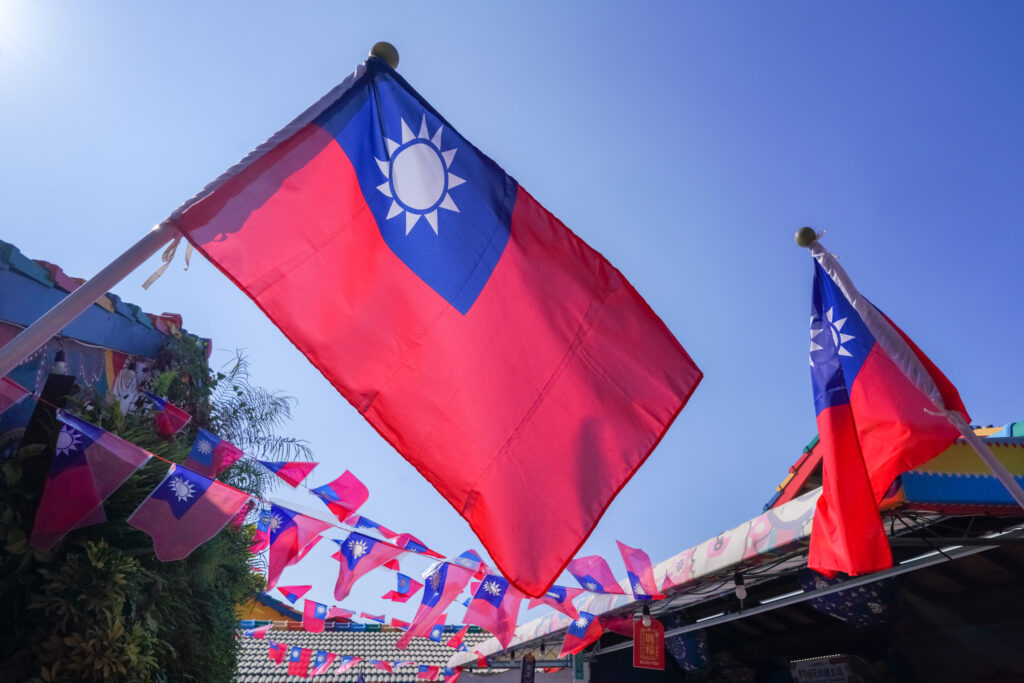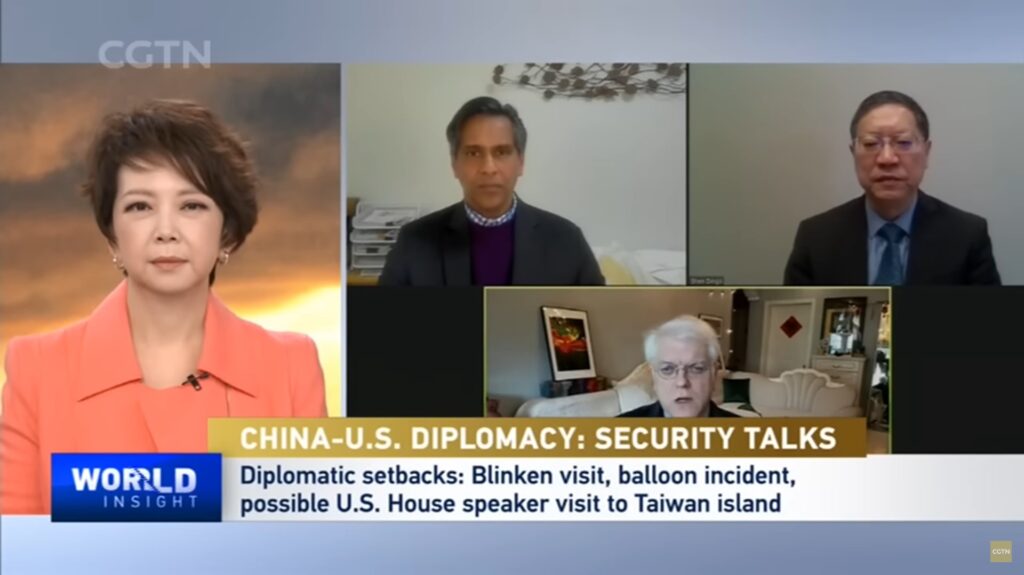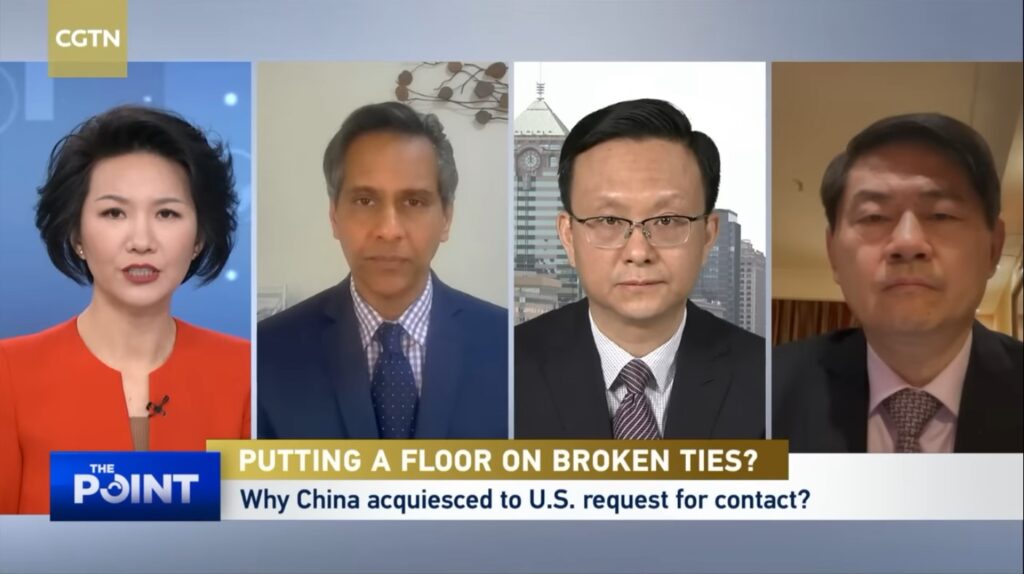
ICAS Bulletin (online ISSN 2836-3418, print ISSN 2836-340X) is published every other week throughout the year at 1919 M St NW, Suite 310, Washington, DC 20036.
The online version of ICAS Bulletin can be found at chinaus-icas.org/bulletins/.

– The U.S. Department of Energy has concluded in a confidential report to the White House and congressional officials that the novel COVID-19 pandemic “most likely” originated from a lab leak. A Beijing spokesperson responded to the report: “Politicizing the issue…will not smear China but will only damage the U.S.’s own credibility.”
– U.S. Senator Rick Scott criticized U.S. President Biden’s response to increasing U.S.-China tensions, stating that “All that Biden does is pacify China.”
– China’s state-owned Xinhua News Agency laid out new lists of issues with the methods of U.S. power usage.
– The Philippines President Marcos granted the U.S. military access to four new defense sites in the country.
– U.S. President Joe Biden stated that he makes no apologies for shooting down the Chinese balloon, adding that the U.S. is improving detection of any such objects in the future. He also clarified that three separate unmanned aerial objects, shot down by the U.S. military, were “most likely tied to private companies.”
– The Chinese Ministry of Foreign Affairs urged Japan and South Korea to separate themselves from the U.S. stance on the “spy balloon” and not to “make a fuss.” The message came as Japan and South Korea reaffirmed their support towards the U.S. response to the balloon.
– President Biden’s top China aide, Laura Rosenberger, is set to depart the administration amidst increasing bilateral tensions, though the departure was “long-planned” and did not involve the balloon incident.
Associated News References:
“China says it’s been ‘open and transparent’ on COVID origins,” AP News, February 28
“China must be ‘more honest’ on Covid origins, U.S. ambassador says,” ABC News, February 28
“Lab Leak Most Likely Origin of Covid-19 Pandemic, Energy Department Now Says,” The Wall Street Journal, February 26 [Paywall]
“Rick Scott criticizes current US relations with Beijing: ‘All that Biden does is pacify China’,” The Hill, February 26
“China says U.S. refused to share information on downed Chinese balloon,” Reuters, February 24 [Paywall]
“China Blasts US for Military, Cultural ‘Hegemony’ as Ties Sour,” Bloomberg, February 20 [Paywall]
“With an Eye on China, Philippines Moves Closer to U.S. Interests,” The New York Times, February 20 [Paywall]
“Joe Biden says he makes no apologies for downing China balloon,” BBC News, February 16
“Biden says three recently downed aerial objects were not linked to Chinese spy program,” CNBC News, February 16
“China calls on Japan, South Korea to shun ‘spy balloon’ rumours and ‘stop following the US’,” South China Morning Post, February 15 [Paywall]
“Japan, South Korea back US response to China spy balloon episode,” Manila Standard, February 15
“Top Biden China aide set for long-planned departure amid heightened tension with Beijing,” CNN News, February 15

– Following a fly-through of the Taiwan Strait by a U.S. military plane, the Chinese People’s Liberation Army claimed the U.S. “deliberately disrupted and undermined the regional situation.”
– U.S. CIA Chief William Burns showcased U.S. intelligence regarding a possible Chinese invasion of Taiwan, stating “President Xi and his military leadership have doubts today about whether they could accomplish that invasion.”
– The Chinese Ministry of Defense spokesman Tan Kefei said that China is determined to block Taiwan independence.
– The U.S. Department of Defense is planning on increasing U.S. troops in Taiwan, as a part of a training initiative by the U.S. for the Taiwanese military.
– U.S. Representatives Gallagher, and Khanna voiced their concern of Chinese cyberattacks and disinformation campaigns after returning from a political trip to Taiwan.
– Taiwanese foreign and security officials met American counterparts in private discussions in Washington, occurring simultaneously as the U.S. deputy Secretary of State went to Taiwan.
– Chinese Minister of Foreign Affairs Qin Gang made remarks urging countries to “immediately stop fueling the fire, stop shifting blame to China and stop touting ‘Ukraine today, Taiwan tomorrow,’”
– Following the controversial trip of the U.S. Deputy Assistant Secretary of Defense for China, Micheal Chase, to Taiwan, the Chinese Foreign Ministry spokesperson Wang Wenbin urged the U.S. to “stop any form of official U.S.-Taiwan contacts,”
– Deputy Secretary of State Wendy Sherman urged countries to warn China against a possible Taiwan conflict: ”I urge all countries to tell the PRC this affects me. This affects my people, my country. This is not a good idea.”
Associated News References:
“China protests US surveillance plane’s Taiwan Strait flight,” AP News, February 26
“CIA Chief Says China Has Doubts About Its Ability to Invade Taiwan,” The Wall Street Journal, February 26 [Paywall]
“Beijing decries ‘contradictory’ US remarks about Taiwan, promises to ‘speak with actions’ against separatist activity,” South China Morning Post, February 24 [Paywall]
“US plans to expand training of Taiwanese forces,” CNN News, February 24
“US Lawmakers Warn of China’s ‘Cognitive War’ After Taiwan Visit,” Bloomberg, February 22 [Paywall]
“Taiwanese foreign, security delegation meets US officials for closed-door talks,” South China Morning Post, February 22 [Paywall]
“China tells world to stop saying Taiwan is the next Ukraine,” Taipei Times, February 22
“China blasts Pentagon official’s Taiwan visit, military ties,” AP News, February 22
“Top Pentagon official to visit Taiwan, report says, amid US-China tensions,” The Guardian, February 17
“U.S. says all countries should warn China against Taiwan conflict,” Reuters, February 15 [Paywall]

– Taiwan’s Ministry of Economic Affairs said on Monday that the U.S.-led Chip-4 alliance (between the U.S., Taiwan, Japan and South Korea) is setting up an “early warning system” to protect its “highly complicated and very global” supply chains.
– Sequoia Capital is consulting independent U.S. national security-experts to vet China’s arm’s investments, as the U.S. looks to stop American funding of sensitive technologies from going to China.
– The U.S. looks to limit the level of advanced semiconductors made by South Korean companies in China according to a senior U.S. official.
– China has become the leader in global nuclear fusion patents, signaling increasing competition between the U.S. and China in nuclear fusion development.
– The Taiwan Semiconductor Manufacturing Company (TSMC) factory in Arizona has been met with increasing controversy by TSMC employees who explained that the project takes away from valued research of semiconductors that outmaneuvers rivals.
– The Biden administration’s new $53 billion Chips Act is set to test whether the U.S. will be able to undo the semiconductor production exodus.
– During a study session of China’s Politburo, President Xi Jinping emphasized China’s need to “strengthen basic research and solve key technology problems from the source” if China wanted to “achieve a high level of self-reliance.”
– China’s most influential scientific body, the Chinese Academy of Science, published outlines of how China could circumvent U.S. chip sanctions.
Associated News References:
“US-led semiconductor alliance setting up ‘early warning system’ to protect supply chains, Taiwan says,” South China Morning Post, February 27 [Paywall]
“Sequoia Turns to Outside National-Security Experts to Vet New China Tech Investments,” The Wall Street Journal, February 24 [Paywall]
“U.S. likely to cap level of S.Korean chips made in China- U.S. official,” U.S. News, February 23
“China Leads Nuclear Fusion Patents,” South Asia Times, February 23
“Inside Taiwanese Chip Giant, a U.S. Expansion Stokes Tensions,” The New York Times, February 22 [Paywall]
“Chips Act Will Test Whether U.S. Can Reverse Semiconductor Exodus,” The Wall Street Journal, February 22 [Paywall]
“China’s Xi Calls for Tech Self-Reliance Amid U.S. Tension,” U.S.News, February 22
“China eyes thwarting US chip curbs,” Taipei Times, February 21

– U.S. President Biden is seeking to reduce the planned restrictions on future American investments in China and Chinese firms, and is seeking U.S. firms to notify federal authorities when investing in industries involving quantum computing and artificial intelligence technologies.
– Despite geopolitical tensions and regulatory challenges, Chinese e-commerce company Temu experienced significant growth in the U.S. market, driven by its competitive pricing, variety of products, and effective marketing strategies this February.
– The House committee on the Chinese Communist party will hold hearings with CEOs and industry representatives on how private equity, venture capital, and Wall Street firms are navigating the complexities of doing business in China.
– U.S. companies, including McDonald’s and Ralph Lauren, are planning expansions in China, viewing its large consumer market as a “promising long-term debt” despite economic and geopolitical concerns.
– U.S.-based company Mountain Pass will supply rare earth elements to Sumitomo in Japan, bypassing China, to diversify and ultimately “strengthen a supply chain of critical importance.”
– Chinese state-owned enterprises (SOEs) have been instructed to phase out contracts with the big four accounting firms as part of the country’s efforts to reduce risks and improve the quality of financial reporting.
– The U.S. Treasury Department expects difficult debt talks at the G20 finance meeting, happening in Indonesia in March 2023, centering debt relief for developing countries impacted by the Covid-19 pandemic.
– China has imposed sanctions on Lockheed Martin and Raytheon in reaction to U.S.-imposed sanctions on Chinese entities, marking China’s latest effort to retaliate against U.S. restrictions.
Associated News References:
“White House scales back plans to regulate U.S. investments in China,” Politico, February 28
“Chinese E-Commerce Flourishes on U.S. Soil,” The Wall Street Journal, February 27 [Paywall]
“Congress to examine operations of US companies in China,” Financial Times, February 27 [Paywall]
“From McDonald’s to Ralph Lauren, U.S. Companies Are Planning China Expansions,” The Wall Street Journal, February 26 [Paywall]
“US-Made Rare Earths to Skip China In Supply Deal With Japan,” Bloomberg, February 22 [Paywall]
“China instructs state firms to phase out big four auditors,” The Guardian, February 22
“U.S. Treasury sees ‘difficult’ debt talks at G20 finance meeting,” Yahoo!Finance, February 22
“China sanctions Lockheed, Raytheon after vowing to retaliate against US restrictions,” CNN News, February 17

– After China called for a cease-fire, Ukrainian President Volodymyr Zelensky outlined plans to seek a meeting with Chinese President Xi Jinping.
– U.S. Secretary of State Antony Blinken reiterated previous claims that China is considering sending Russia military assistance towards the war in Ukraine, despite China refuting the claim.
– China has called for a cease-fire and peace talks in the Russian war on Ukraine, releasing an official position paper on the first anniversary of the invasion. The position paper fell flat with both the U.S. and European allies, as NATO Secretary General cited China’s lack of credibility.
– China pushed back against U.S. accusations that it has been considering lethal aid to Russia, as the spokesperson of the Chinese Foreign Ministry stated China “does not offer any arms sales to conflict zones or parties involved in wars.”
– During his EU tour, China’s State Councillor Wang Yi said the U.S. should not use the balloon incident to further agendas abroad and reaffirmed China-Russia ties.
– Chinese Foreign Minister Qin Gang told actors at a security conference in Beijing that China is concerned about the Russian-Ukrainian war, and that China is seeking an active role in peace talks.
– China told the United Nations that “brutal facts offer an ample proof that sending weapons will not bring peace.”
– U.S. Secretary of State Antony Blinken warned top Chinese diplomat Wang Yi that China will face consequences if they choose to send weapons to assist Russia in the Ukrainian war. The Chinese Ministry of Foreign Affairs spoke out against such claims: “It’s the U.S., and not China, that has incessantly [been] supplying weapons to the battlefield.”
Associated News References:
“Ukraine war: Zelensky wants Xi Jinping meeting following China’s peace plan,” BBC News, February 25
“US reiterates claim that China is considering sending Russia military help for Ukraine war,” South China Morning Post, February 24 [Paywall]
“China calls for a cease-fire and peace talks between Russia and Ukraine,” NPR News, February 24
“China Dismisses US Claim Over Possible Weapons Sales to Russia,” Bloomberg, February 24 [Paywall]
“China Cease-Fire Proposal for Ukraine Falls Flat With US, Allies,” Bloomberg, February 23 [Paywall]
“China’s top diplomat Wang Yi scolds US, praises Russia ties at end of EU tour,” South China Morning Post, February 24 [Paywall]
“China says sending weapons to Ukraine will not bring peace,” Al Jazeera, February 23
“China says it’s seeking role in Ukraine peace settlement,” ABC News, February 21
“China Says U.S. Is ‘Not Qualified’ to Issue Orders on Arms,” The New York Times, February 20 [Paywall]
“Blinken warns China’s Wang Yi against aiding Russia in Ukraine,” Reuters, February 19 [Paywall]
“U.S. Aims to Pull Ex-Soviet Republics From Russian, Chinese Orbits,” The Wall Street Journal, February 28 [Paywall]
“Leaders of House China panel denounce attack on Rep Judy Chu,” AP News, February 26
“China-Russia Space Alliance Stumbles in Bid to Surpass US,” Bloomberg, February 26 [Paywall]
“Bipartisan Plans to Move Aggressively on China Face Political Hurdles in Congress,” The New York Times, February 25 [Paywall]
“Chinese fighter jet confronts US Navy plane with CNN crew aboard as tensions simmer in the South China Sea,” CNN News, February 24
“Chinese Jet Fighter Shadows U.S. Aircraft Over South China Sea,” The Wall Street Journal, February 24 [Paywall]
“China aims to launch nearly 13,000 satellites to ‘suppress’ Elon Musk’s Starlink, researchers say,” South China Morning Post, February 24 [Paywall]
“European Commission bans TikTok from corporate devices,” Euractiv, February 23
“Ant Group links up with NBA on ‘strategic partnership’ to promote sport in China as league continues its revival,” South China Morning Post, February 21 [Paywall]
February 24 hosted by U.S.-China Economic and Security Review Commission
February 15 hosted by Brookings
February 10 hosted by Foreign Policy
February 9 hosted by East-West Center
February 9 hosted by East-West Center
March 6 hosted by Center for Strategic and International Studies
March 7 hosted by Wilson Center
March 10 by Brookings
March 9 hosted by East-West Center
March 10 hosted by Brookings
By Nong Hong
February 25, 2023
“The Ukraine crisis has changed the world in many ways, one of which is the functionality of the Arctic Council, a forum that Russia currently chairs. The decision by the other seven council members in March last year to stop joining its meetings is a grave impediment to international cooperation in the Arctic. Concerns have also been raised over the role of the observer states, including China, Japan, South Korea, Singapore and India.
Climate change has made the Arctic and its potential resources more accessible. This has changed the geopolitical landscape, and more countries are now focused on the Arctic, including in distant Asia. For China, Japan, South Korea, Singapore and India, their observer status ensures that they are involved in determining the future of the Arctic, a region they believe will affect their economic interests and the environment…
This commentary was originally released on South China Morning Post on February 25, 2023
On Wednesday, February 22, 2023, Senior Fellow Sourabh Gupta discussed US-China diplomacy amidst the Munich Security Conference on CGTN’s World Insight with Tian Wei.
On Monday, February 20, 2023, Senior Fellow Sourabh Gupta spoke about the Blinken-Wang meeting alongside the Munich Conference on CGTN’s The Point with Liu Xin.



The Institute for China-America Studies is an independent nonprofit, nonpartisan research organization dedicated to strengthening the understanding of U.S.-China relations through expert analysis and practical policy solutions.
1919 M St. NW Suite 310,
Washington, DC 20036
icas@chinaus-icas.org
(202) 968-0595
© 2025 INSTITUTE FOR CHINA-AMERICA STUDIES. ALL RIGHTS RESERVED.